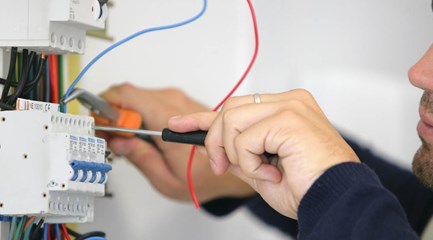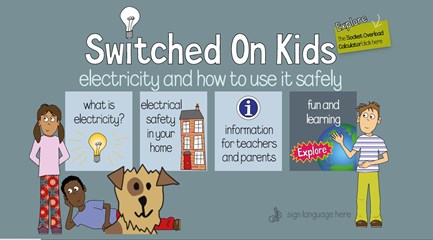Electrical Safety First has produced an expert Q&A following increased enquiries from private landlords as the deadline for complying with the new laws in England approaches:
I’m a private landlord, how has the law changed?
As of 1st June 2020 five yearly mandatory electrical safety checks came into force for all new tenancies in privately rented properties in England. The same law will be introduced to cover all existing tenancies in the private rented sector from April 1st 2021.
What is an EICR?
An EICR (an abbreviation for Electrical Installation Condition Report) is the document that will be issued by an electrician after they have carried out an inspection and test of the electrical installation in your property, to either formally declare that it is safe for continued use or highlight any suggested or urgent repairs that need to be made. Much like how many of us would have a health screening, an EICR will highlight any work that needs undertaking to ensure your installation is healthy and presents no immediate or potential danger to your tenants or the property.
I had a safety check carried out on my property less than four years ago – do I still need to get an EICR done?
Many landlords will do their best to ensure their properties are safe and will have carried out safety checks in the last four years or less. If the landlord can present a document, such as an EICR, conducted within the last four years or less then, on the basis the installation was assessed as ‘Satisfactory’ and that no other obvious signs of damage to the installation are visible, a new EICR would not be required until five years has passed since the last report (EICR) was issued.
How much does an EICR cost and who should do it?
An EICR will cost a landlord approximately £150-£300, depending on the size and location of the property, on the basis no further work is needed to ensure the electrical installation of the property is safe for continued use. A satisfactory EICR will mean a repeat inspection won’t be necessary for another five years unless otherwise specified on the report. The EICR should be completed by a person competent in inspection and testing, such as a registered electrician – you can find one at www.electricalsafetyfirst.org.uk/findanelectrician
Are these not burdensome on landlords?
No. Electrical Safety Checks not only protect the tenants but also help prevent damage to the landlord’s property. Unlike annual gas safety checks, electrical safety checks will only need to be carried out once every five years assuming no remedial work is needed, and take about a half day to complete.
Who needs to carry out the EICR?
Landlords should only employ a registered electrician who is specially assessed to carry out an electrical safety check on the property. Using an electrician who is registered with a competent persons scheme will afford you more protection and a complaints resolution procedure in the rare event anything goes wrong. You can find a registered electrician near you on our website at www.electricalsafetyfirst.org.uk/findanelectrician and select the option ‘To undertake an electrical safety report’.
Should the inspection state remedial work is necessary landlords should only use a registered electrician to undertake this work by going to the same website and selecting the option ‘To carry out installation or remedial work’
I can’t get access to my property to conduct an EICR what can I do?
The new legislation states that landlords will not be in breach of the regulations if they can demonstrate they have taken all reasonable steps to comply. If for example, your tenant was refusing access to the property for an electrical safety check to be carried out, communications between the landlord and the tenant should be documented and kept as evidence of an attempt to comply. We recommend documenting and keeping all communications with both tenants and the electrician so that a landlord can clearly show they have attempted to comply with the regulations.
Although there are still restrictions in place due to Covid-19, these electrical checks are legally allowed to go ahead, but if tenants are shielding or refuse access, this could lead to a delay in accessing the property, in which case the landlord should keep the correspondence to show that they have attempted to comply.
Do I need to get a new safety report carried out every time a new tenant moves in?
No. A safety report only needs to be completed every five years on the basis no faults were previously discovered. However, landlords must supply new tenants with a copy of the current EICR at the start of their tenancies.
What are the penalties if I don’t comply and who enforces them?
Local authorities will be responsible for enforcing the new regulations. If a landlord is found to not have complied with the law and no attempt to has been made to complete necessary remedial work that was identified they could face a penalty fine of up to £30,000.
Why are mandatory electrical checks necessary?
Much in the same way gas is regulated for the sake of safety, electrical installations deteriorate over time and can gradually present a risk of fire or electric shock if they are not maintained. Fatal incidents have also occurred in the past, such as the death of mother Thirza Whittall as well as the death of Professor John Alliston, both of whom were electrocuted in privately rented properties. Electricity causes more than half of accidental domestic fires in the UK every year and the new laws for privately rented homes will better protect millions across England.
What if I rent out a new build and have an EIC? Do I need to get an EICR too?
No. If the property is a new build or has been completely rewired you will not need an EICR until five years has lapsed from the when the current Electrical Installation Certificate (EIC) was issued.
I have an EIC that says the next inspection isn’t due for another 10 years do I need an EICR?
Under the new regulations your EIC will now only be sufficient for 5 years, not 10 as indicated on your certificate. If five years or more has lapsed since your EIC was issued you will be in breach of the regulations and should ensure an EICR is undertaken.
I have had my fuse box recently replaced and was issued an EIC with it, will this satisfy the new regulations?
No. The replacement of a fuse box and the supplementary EIC will not provide sufficient detail to report on the condition of the existing installation and therefore an EICR is still requirement to comply with the new legislation. Landlords should ensure they ask for both an EIC and EICR for any fuse box replacement.
My electrical installation inspection failed, and I have had remedial work undertaken. Do I need another EICR conducted to prove it is safe?
No. A failed EICR alongside documentation of remedial work completed will be enough to satisfy and comply with the new regulations. Landlords should ensure all documents are kept safe, and provide copies to the local authority and tenant.
You can find all of our guidance for landlords, including a free to download leaflet, here.
More posts by Samantha Mager



